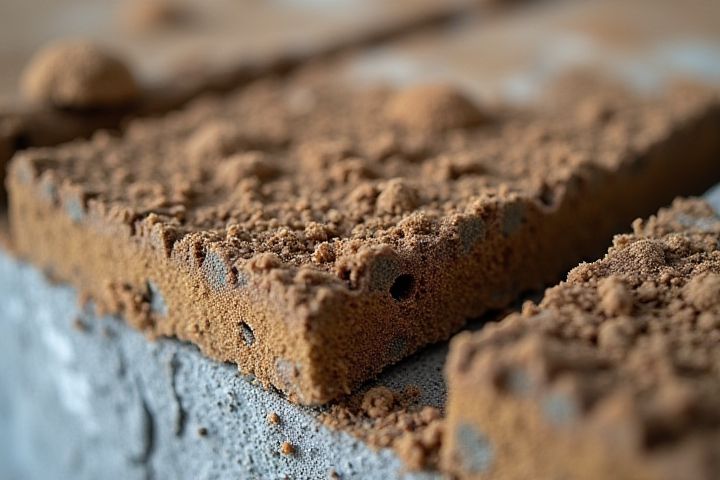
A house foundation serves as the critical support structure that bears the weight of the entire building, ensuring stability and durability over time. It prevents settlement and shifts that can lead to structural damage, safeguarding your investment in property. Properly designed foundations also protect against moisture intrusion, reducing the risk of mold and mildew, which can impact indoor air quality. Moreover, a well-constructed foundation aids in insulation and energy efficiency, contributing to lower utility bills. Understanding the essential role of a foundation can help you make informed decisions for construction or renovation projects.
Why Is House Foundation Important
Structural stability
The house foundation is crucial for structural stability, as it bears the weight of the entire structure, distributing it evenly to prevent settling or shifting. A strong foundation material, such as reinforced concrete or steel, ensures the durability and longevity of your home while resisting environmental stresses like soil movement and moisture. Properly laid foundations can reduce the risk of costly repairs, with foundation issues potentially leading to 15-20% decrease in property value. Investing in a sound foundation design from the outset can safeguard your house against future structural failures and provide peace of mind.
Load distribution
A house foundation plays a critical role in load distribution, ensuring that weight from the structure is evenly spread across the soil beneath. This helps prevent uneven settling, which can lead to structural issues like cracks and shifting walls. For example, a well-designed foundation can effectively support a typical load of 40 pounds per square foot from the house, while mitigating the risk of excess pressure on any single point in the soil. By maintaining stability and integrity, a solid foundation safeguards your investment and enhances the longevity of your home.
Moisture prevention
A solid house foundation serves as the first line of defense against moisture intrusion, which can lead to structural damage and mold growth. Proper drainage systems, such as French drains or sump pumps, are critical for diverting water away from the foundation, reducing the risk of soil saturation and flooding. Implementing moisture barriers and proper landscaping techniques can help maintain a dry foundation environment, ensuring that your home remains safe and stable for years to come. Investing in foundation waterproofing measures protects your property value, with the potential of increasing it by 10-20% in areas prone to water damage.
Thermal efficiency
A well-constructed house foundation significantly enhances thermal efficiency, impacting energy consumption and comfort levels. By using insulating materials such as foam board or advanced thermal wraps during construction, foundations can reduce heat loss in the winter and heat gain in the summer. This results in lower energy bills, often up to 20% less, depending on climate and design. Prioritizing thermal efficiency in your foundation not only promotes a sustainable environment but also increases overall property value.
Pest control
A solid house foundation is crucial for pest control as it acts as the primary barrier between your living space and the outdoor environment, reducing the entry points for unwanted pests. Cracks or gaps in the foundation can provide easy access for termites, rodents, and other pests, leading to potential damage and health risks. Maintaining a well-sealed foundation also minimizes moisture accumulation, which attracts pests like ants and cockroaches. Regular inspection and maintenance of your foundation are essential for ensuring your home remains pest-free and structurally sound.
Energy efficiency
A well-constructed foundation is crucial for energy efficiency, as it directly impacts a home's thermal performance. Insulated foundations can reduce heat loss by up to 25% compared to uninsulated ones, lowering your heating costs. Proper foundation moisture barriers prevent dampness, which can lead to mold growth and high energy bills due to increased humidity. Investing in a quality foundation not only enhances the durability of your home but also significantly improves its overall energy efficiency.
Property value
A solid house foundation is crucial as it directly influences property value, with homes featuring strong foundations typically appreciating better in the real estate market. Poor foundation integrity can lead to significant issues such as cracks, water damage, and uneven floors, which can diminish your property's worth by up to 15%. In a study, homes with foundation problems sold for approximately 25% less than comparable properties with stable foundations. For homeowners, maintaining a sound foundation is essential not just for safety, but also for maximizing your investment in the long term.
Safety and longevity
A house foundation is crucial for ensuring safety and longevity, as it provides structural stability by distributing the building's weight evenly across the ground. An adequately constructed foundation can prevent costly issues such as cracking walls or water damage, which can arise from soil shifts or settling. For homeowners, a strong foundation can add significant value to the property, often contributing 15%-20% of the home's overall market value. Investing in quality materials and professional installation can significantly extend the lifespan of your home, often exceeding 50 years with proper maintenance.
Legal regulations
A house foundation is crucial for maintaining structural integrity and longevity, adhering to local legal regulations that ensure safety standards are met. Building codes often mandate specific foundation requirements to resist environmental factors like soil erosion and seismic activity, emphasizing the need for compliance. For instance, in areas susceptible to flooding, the foundation must be elevated to a certain height to prevent water damage, as outlined in FEMA regulations. Ensuring your foundation meets these legal guidelines not only protects your investment but also safeguards your family's well-being.
Insurance requirements
A strong house foundation is crucial not only for structural stability but also for meeting insurance requirements, which often mandate certain standards to qualify for coverage. Properly built foundations help prevent issues like water intrusion and settling, which can lead to diminished property value and increased repair costs. Insurance companies typically assess the foundation's condition when determining risk; inadequate foundations may result in higher premiums or denial of coverage altogether. Ensuring your foundation meets local building codes and recommendations can protect your investment while satisfying insurance stipulations.
